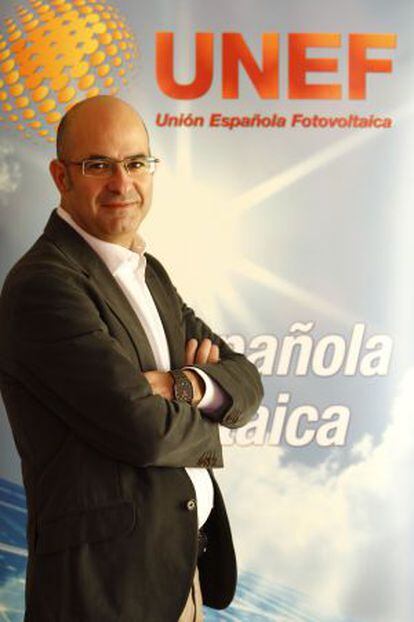"We could end up with a bad bank for renewable energy assets"
The president of the Spanish Photovoltaic Union, Jorge Barredo, is concerned about the sector He feels a royal decree has hurt the industry as well as Spain's image abroad

The Spanish renewable energies industry is on a war footing with the government. The sector has accused Industry, Energy and Tourism Minister José Manuel Soria of trying to pin the blame for the tariff deficit - the difference between the actual cost of producing electricity and the regulated rates charged to consumers - on the premiums that renewable energy producers receive. This shortfall last year amounted to 4.281 billion euros. According to Jorge Barredo, the president of the Spanish Photovoltaic Union (Unef), the manifest intent of the government to eliminate the deficit by cutting renewable energy producers' premiums via a royal decree is hurting not only an industry in expansion and the economic future of Spain, but also the country's image abroad.
Question. You are seriously disgruntled with the government and the minister in particular.
Answer. The fact is they are ruining us. The latest reforms to the energy sector both by the current government and its predecessor have caused revenues at certain power plants to fall by almost 40 percent. But the latest decree that decouples electricity rates from inflation means this drop in revenues will increase.
Q. What impact has de-indexation had on the sector?
A. The basic problem is that we can't see any end to this. Up until now the banks thought the problem would be confined to this year and that the situation would improve with the economic recovery. Now they're not so sure. With the cuts in premiums, many plants are not taking in enough to service their debt, which means they are dipping into their cash flow. In many cases the loan guarantee is the plant itself. If the banks decide to call in loans, they are going to find that we don't have enough money to pay them off, which means they will be left with assets they can't sell because no one wants to invest in Spain at the moment. And even if they don't, auditors will take note of the situation, the loans will be reclassified, banks will have to make provisions for potential losses, and we could end up with a Sareb [the so-called bad bank set up by the government to absorb the toxic real estate assets of lenders] for renewable energy assets. The ball is in motion and we don't know where this is going to end up.
Q. Who does your association represent?
The latest reforms have caused some plants' revenues to fall by 40 percent"
A. In the solar power sector there are all types of investors. There are some 200,000 individuals who have put up their homes as guarantees, who have given up land and who have used their savings, but there are also companies and investment funds, including big international investors. The latter have sought international arbitration and told us they are ready to divest everything they have in Spain and pack up and go because they don't believe in Spain's legal security.
Q. What is the government's attitude toward the renewables sector?
A. For the government, the renewable energy sector is the scapegoat for all the ills of Spain when 86 percent of the balance of payments deficit comes from imported fuels. What gets to us most is that in the royal decrees they have passed they say things that are not true. We reject the assertion that renewable energies, particularly photovoltaic, are more expensive. All the time the government claims there is an imbalance in photovoltaic energy production. It's not true. Everything the plants receive is perfectly controlled and calculated. Either there is sun or no sun and of course these figures are known to the ministry.
Q. Have you discussed the situation?
Big international investors have told us they don't believe in Spain's legal security"
A. Things have improved with the arrival of Alberto Nadal as secretary of state for energy. Although he hasn't come from the sector, he is someone you can speak with. He is open to dialogue, which is something new because before there was no exchange with the government. The new secretary wants to completely overhaul the sector, which is absolutely necessary, but perhaps he is trying to do so too quickly.
Q. Do you think the government was right to pass on the fall in energy costs to consumers?
A. It's understandable given that people are having a hard time of it. But when the cost of energy rises by 7 percent at wholesale tenders for electricity, that hike isn't passed on to consumers. It would have been better for consumers themselves to have the deficit problem resolved beforehand.
Q. What's to be done about the deficit? What is the role of renewable energy in this?
We reject the assertion that renewable energies are more expensive"
A. The tariff deficit is a problem that has to be resolved. But it's not the fault of renewables. There are renewables in Germany and Italy but they don't have a deficit problem. There are other factors such as distribution costs, transportation, and so on, which also help swell the deficit. But the government wants to put across the message that renewables are expensive and raise the price of energy. Quite the opposite.
Q. Is there a bubble in the solar energy sector?
A. No. You have to put things in context. Spain is the eighth-biggest producer of photovoltaic energy in the world. Germany and Italy have got more installed capacity and Japan is about to overtake us. It has been said we have the most installed capacity, but that's a big lie. What has happened is that the previous government did not put in place the legislation required to match production with the country's needs.
Q. What is the sector looking for now?
Other forms of energy will soon have to protect themselves from photovoltaic"
A. A balance between what is produced and consumed. If a consumer installs a photovoltaic panel on the roof of their house, the energy that for one reason or other they don't consume goes to the electricity grid. What we want to see is all of the electricity going to the grid being consumed at a later time. [...] The government keeps putting off regulating this.
Q. Why?
A. Because we have calculated that self-consumption with a net balance could account for up to 20 percent of the market, particularly in areas with the right climate, such as the south of the mainland and the islands. This energy would cease to be consumed in existing traditional power plants, which, according to the government, would make the tariff deficit increase more. They're not thinking in the long-term, only in covering the next year.
Q. What is the future of photovoltaic energy globally?
A. Few doubt that photovoltaic energy is the future. I believe that in a short time other forms of energy will have to protect themselves from photovoltaic because costs are increasingly lower and economies of scale have increased. They are building huge installations in the Middle East.











































